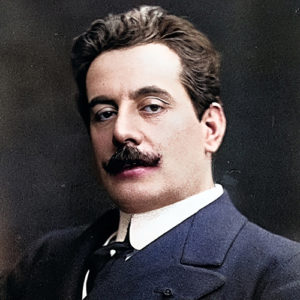Your basket is currently empty!
Puccini, Giacomo

Giacomo Puccini was an Italian composer born on December 22, 1858, in Lucca, Tuscany, Italy. He is widely regarded as one of the greatest exponents of operatic realism and is known for bringing the history of Italian opera to a close with his works. Puccini’s most famous operas include “La Bohème” (1896), “Tosca” (1900), “Madama Butterfly” (1904), and “Turandot” (1924), which was left incomplete at his death. His music is celebrated for its melodic richness and dramatic depth.
Puccini came from a family with a long tradition of music; he was the sixth of nine children of Michele Puccini and Albina Magi. His family had been the musical directors of the Cathedral of San Martino in Lucca for two centuries. After the death of his father, the municipality of Lucca supported the family and reserved the position of cathedral organist for Giacomo until he came of age. He first studied music with his father’s former pupils and played the organ in local churches.
A pivotal moment in Puccini’s life was witnessing a performance of Giuseppe Verdi’s “Aida” in 1876, which convinced him that his true calling was opera. He later attended the Milan Conservatory, where he studied under Antonio Bazzini and Amilcare Ponchielli. His graduation composition, “Capriccio sinfonico,” garnered attention in Milan’s musical circles.
Puccini’s career spanned the late Romantic period into the early modern era of opera. His works are characterized by their emotional intensity, intricate vocal writing, and incorporation of verismo elements—a style focused on realism and everyday subjects.
He passed away on November 29, 1924, in Brussels, Belgium, leaving behind a legacy that continues to resonate in opera houses around the world
Puccini came from a family with a long tradition of music; he was the sixth of nine children of Michele Puccini and Albina Magi. His family had been the musical directors of the Cathedral of San Martino in Lucca for two centuries. After the death of his father, the municipality of Lucca supported the family and reserved the position of cathedral organist for Giacomo until he came of age. He first studied music with his father’s former pupils and played the organ in local churches.
A pivotal moment in Puccini’s life was witnessing a performance of Giuseppe Verdi’s “Aida” in 1876, which convinced him that his true calling was opera. He later attended the Milan Conservatory, where he studied under Antonio Bazzini and Amilcare Ponchielli. His graduation composition, “Capriccio sinfonico,” garnered attention in Milan’s musical circles.
Puccini’s career spanned the late Romantic period into the early modern era of opera. His works are characterized by their emotional intensity, intricate vocal writing, and incorporation of verismo elements—a style focused on realism and everyday subjects.
He passed away on November 29, 1924, in Brussels, Belgium, leaving behind a legacy that continues to resonate in opera houses around the world